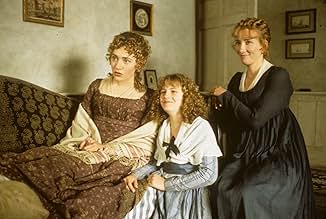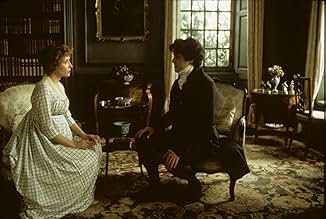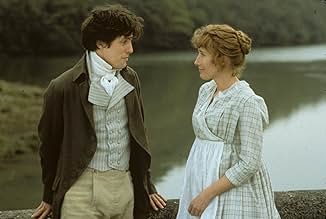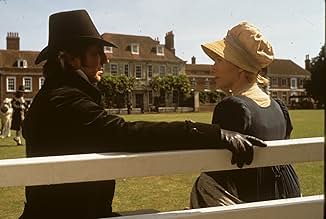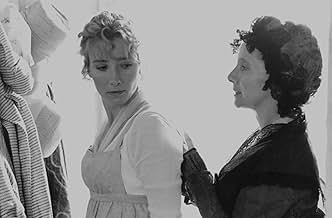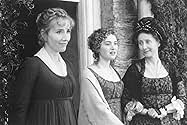Der reiche Mr. Dashwood stirbt und lässt seine zweite Frau und ihre drei Töchter nach den Regeln der Erbschaft arm zurück. Die beiden ältesten Töchter sind die sogenannten Gegensätze.Der reiche Mr. Dashwood stirbt und lässt seine zweite Frau und ihre drei Töchter nach den Regeln der Erbschaft arm zurück. Die beiden ältesten Töchter sind die sogenannten Gegensätze.Der reiche Mr. Dashwood stirbt und lässt seine zweite Frau und ihre drei Töchter nach den Regeln der Erbschaft arm zurück. Die beiden ältesten Töchter sind die sogenannten Gegensätze.
- 1 Oscar gewonnen
- 33 Gewinne & 50 Nominierungen insgesamt
Myriam Emilie Francois
- Margaret Dashwood
- (as Emilie François)
Handlung
WUSSTEST DU SCHON:
- WissenswertesDirector Ang Lee originally was considering Kate Winslet only for the smaller part of Lucy Steele, even though she really wanted to play Marianne. When Winslet arrived at her audition, she pretended that her agent had sent her to read for Marianne, and her reading won her the role.
- PatzerWhen the fiddler exits the church at the wedding, the fiddle is fitted with a chin-piece, which was not used on fiddles until the 20th century.
- Zitate
Edward Ferrars: I-I've come here with no expectations, only to profess, now that I am at liberty to do so, that my heart is, and always will be, yours.
Ausgewählte Rezension
If it wasn't for Jane Austen's novels and their screen-adaptation, we wouldn't be much familiar with the English gallantry and the bourgeois manners of the early 19th century. Her oeuvre encapsulated a time where women didn't have a way to go through life without landing on the "marriage" square, hardly an issue to please feminists but who would call Austen traditional or submissive for all that? She respected the conventions but made powerful social commentaries in the indirect sense that her female protagonists never married someone they didn't love. Marriage was the end, but love was the means to achieve it, while marriage of convenience was the privilege of the mediocre ones.
Now, there is an interesting point of comparison between her two most celebrated novels: "Sense and Sensibility" and "Pride and Prejudice". "Sense" was Austen's first success, written at a very young age, yet it deals with characters evolving in the realm of adulthood, while in "Pride", written by an older Austen, the heroines are the Bennett Sisters who aren't older than twenty. It is just like Austen was a painter who had to go to the top of the mountain to have a clear view on a plain after having painted the mountain from the plain. With enough experience and wisdom, she was able to make a brighter portrait of a young generation who get the man through their actions. In "Sense", the Dashwood sisters are fully-dimensional characters, Elinor (Emma Thompson) is reserved and introverted while Marianne (Kate Winslet) is romantic and flamboyant, they're more mature than the Bennetts sisters, but at the expense of their reactivity.
In "Pride", luck and men's valiance were not elements to count on, and many round trips allowed the heroine to confront her suitor. It is possible that "Pride" was a bit too modern while "Sense" was more obedient to the perception of women's role at the time (rather static), but the directing by Ang Lee and the screenplay worked in such a way that the quest for marriage isn't actually the most interesting part of the film. And while I don't think I give away the ending by saying that each one will find the true love, it's obviously not the point of suspense; the real question is how these people interact. And just like your typical Austen's stories, there's a good deal of passions and deception, or romantic studs popping up at the right moment and forcing the women to all align in the house to promptly welcome their host. Some are dark and brooding (Alan Rickman) other shy and amiable (Hugh Grant) and a few too perfect to be true (Greg Wise) but they all have one thing in common, they're conveniently called to office in London whenever marriage seems too close, a snobby bitch or karma playing the same game postponing the overdue rendezvous with destiny.
But as predictable as these films are, their quality is elsewhere, starting with the acting. Literary movies have this quality that the abundance of words and plots can sometimes distract from simpler moments that actually elevate them more than any monologue or speech. This moment occurs when Edward (Grant), is ready to confess something to Elinor. They have spent enough time together to grow a deep feeling. He's about to say something about his you expect the word "feeling", he says "education", and you can see something click in the blink of an eye in Thompson's face, 'devastation' as it would really show in a woman who learned to hide her feelings. There's no doubt that Emma Thompson is one of the greatest actress of her generation. On the other hand, Marianne will also face abandon and the reaction will fit her passionate personality. While, the plot in itself can be summed up by women waiting for the right men to come, so (God forbid), they don't end up as bitter spinster, there is more to enjoy, the text and more importantly, the subtext.
And on that level, Jane Austen's stories are exhilarating hymns for eloquence and literacy, whether when the characters write intimate correspondences, share their personal thoughts with their friends or relatives or try to convey a strong message by still respecting the conveniences, I just can't resist by the way Shakespeare's language is being honored. You finish the film and you just want to express your feelings with the same economy of obviousness or flamed passion when called for, and a similar urge generally invade me when I finish the Ivory and Merchant movies. There is something just irresistible in these British heritage films, they make you realize how close we still are to these times by the scale of history, but light-years ahead as far as mediocrity and plainness is concerned.And it's a credit to Austen's writing and Thompsons's rewriting (earning her an Oscar) to have translated the story in a tone that wouldn't make feminists' neck hair stand up and wouldn't portray men as misogynistic pigs.
The film says something important: the strength of your character doesn't depend on what he or she accomplishes but how it can strongly affect your own feeling or how can they resist the cruelties of life without necessarily triumphing over them. All through the film, I was totally rooting for Marianne, Elinor, their mother (Gemma Jones) and the way they endorsed or rebelled against conventions at crucial times where simpler things were complicatedly expressed. Indeed, everything that happened is due to something said, a promise or a misunderstanding. It's all in the way words are used, misused or distorted and that's one of the many delights in this lavish movie.
Now, there is an interesting point of comparison between her two most celebrated novels: "Sense and Sensibility" and "Pride and Prejudice". "Sense" was Austen's first success, written at a very young age, yet it deals with characters evolving in the realm of adulthood, while in "Pride", written by an older Austen, the heroines are the Bennett Sisters who aren't older than twenty. It is just like Austen was a painter who had to go to the top of the mountain to have a clear view on a plain after having painted the mountain from the plain. With enough experience and wisdom, she was able to make a brighter portrait of a young generation who get the man through their actions. In "Sense", the Dashwood sisters are fully-dimensional characters, Elinor (Emma Thompson) is reserved and introverted while Marianne (Kate Winslet) is romantic and flamboyant, they're more mature than the Bennetts sisters, but at the expense of their reactivity.
In "Pride", luck and men's valiance were not elements to count on, and many round trips allowed the heroine to confront her suitor. It is possible that "Pride" was a bit too modern while "Sense" was more obedient to the perception of women's role at the time (rather static), but the directing by Ang Lee and the screenplay worked in such a way that the quest for marriage isn't actually the most interesting part of the film. And while I don't think I give away the ending by saying that each one will find the true love, it's obviously not the point of suspense; the real question is how these people interact. And just like your typical Austen's stories, there's a good deal of passions and deception, or romantic studs popping up at the right moment and forcing the women to all align in the house to promptly welcome their host. Some are dark and brooding (Alan Rickman) other shy and amiable (Hugh Grant) and a few too perfect to be true (Greg Wise) but they all have one thing in common, they're conveniently called to office in London whenever marriage seems too close, a snobby bitch or karma playing the same game postponing the overdue rendezvous with destiny.
But as predictable as these films are, their quality is elsewhere, starting with the acting. Literary movies have this quality that the abundance of words and plots can sometimes distract from simpler moments that actually elevate them more than any monologue or speech. This moment occurs when Edward (Grant), is ready to confess something to Elinor. They have spent enough time together to grow a deep feeling. He's about to say something about his you expect the word "feeling", he says "education", and you can see something click in the blink of an eye in Thompson's face, 'devastation' as it would really show in a woman who learned to hide her feelings. There's no doubt that Emma Thompson is one of the greatest actress of her generation. On the other hand, Marianne will also face abandon and the reaction will fit her passionate personality. While, the plot in itself can be summed up by women waiting for the right men to come, so (God forbid), they don't end up as bitter spinster, there is more to enjoy, the text and more importantly, the subtext.
And on that level, Jane Austen's stories are exhilarating hymns for eloquence and literacy, whether when the characters write intimate correspondences, share their personal thoughts with their friends or relatives or try to convey a strong message by still respecting the conveniences, I just can't resist by the way Shakespeare's language is being honored. You finish the film and you just want to express your feelings with the same economy of obviousness or flamed passion when called for, and a similar urge generally invade me when I finish the Ivory and Merchant movies. There is something just irresistible in these British heritage films, they make you realize how close we still are to these times by the scale of history, but light-years ahead as far as mediocrity and plainness is concerned.And it's a credit to Austen's writing and Thompsons's rewriting (earning her an Oscar) to have translated the story in a tone that wouldn't make feminists' neck hair stand up and wouldn't portray men as misogynistic pigs.
The film says something important: the strength of your character doesn't depend on what he or she accomplishes but how it can strongly affect your own feeling or how can they resist the cruelties of life without necessarily triumphing over them. All through the film, I was totally rooting for Marianne, Elinor, their mother (Gemma Jones) and the way they endorsed or rebelled against conventions at crucial times where simpler things were complicatedly expressed. Indeed, everything that happened is due to something said, a promise or a misunderstanding. It's all in the way words are used, misused or distorted and that's one of the many delights in this lavish movie.
- ElMaruecan82
- 3. März 2017
- Permalink
Top-Auswahl
Melde dich zum Bewerten an und greife auf die Watchlist für personalisierte Empfehlungen zu.
- How long is Sense and Sensibility?Powered by Alexa
Details
- Erscheinungsdatum
- Herkunftsländer
- Sprachen
- Auch bekannt als
- Sensatez y sentimientos
- Drehorte
- Produktionsfirmen
- Weitere beteiligte Unternehmen bei IMDbPro anzeigen
Box Office
- Budget
- 16.000.000 $ (geschätzt)
- Bruttoertrag in den USA und Kanada
- 43.182.776 $
- Eröffnungswochenende in den USA und in Kanada
- 721.341 $
- 17. Dez. 1995
- Weltweiter Bruttoertrag
- 134.582.776 $
- Laufzeit2 Stunden 16 Minuten
- Farbe
- Sound-Mix
- Seitenverhältnis
- 1.85 : 1
Zu dieser Seite beitragen
Bearbeitung vorschlagen oder fehlenden Inhalt hinzufügen





